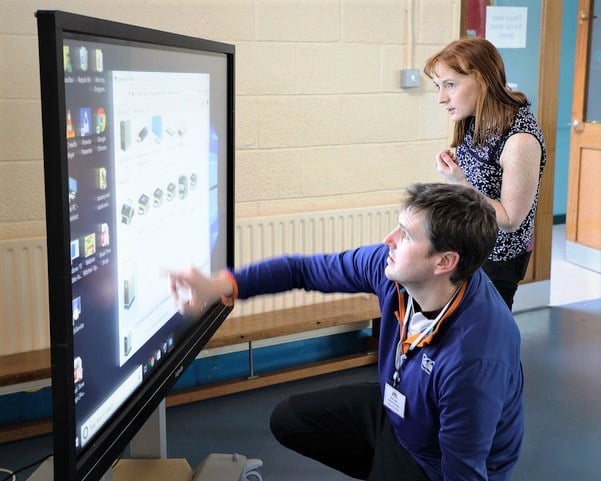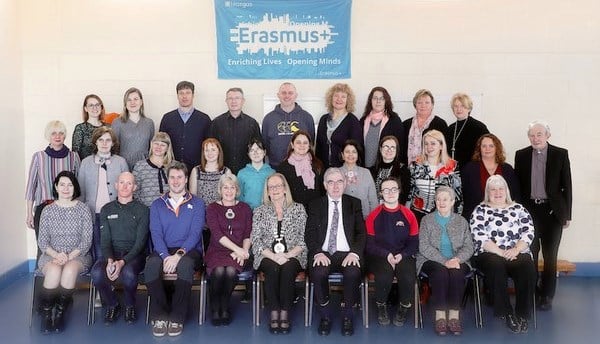Flying the flag for a healthy Europe
Éilis Dillon has been principal of St. Cecilia’s School, Cregg, Sligo, since December 2004. There are 50 students in this special school which caters for those with moderate, severe and profound learning disability. She is currently in her second term as Chairperson of National Association of Boards of Management in Education.
St. Cecilia’s School in Sligo are delighted to be participating in a three-year Erasmus+ project with partners from Estonia, Latvia, Portugal, Romania and the UK. We are all involved in special education across the spectrum, from children beginning school to adults. Our project “Flying the flag for a healthy Europe” aims to develop healthy ambassadors within our schools/centres who will in turn bring this information to the wider community. What is important, and we feel unique, is that this project is being initiated in special education and transferred back to the wider community.
Energy and emphasis
Being part of an Erasmus+ project is a fantastic opportunity to work with partners across Europe. There are three transnational meetings a year, as well as contact by email and post. There is much to be learned from visiting other schools and centres. Seeing other facilities and hearing about creative ideas can stimulate new energy that each of us then brings back to our individual settings. While there is much that is similar in the various countries, there are also differences in emphasis which are interesting to observe and reflect on. For example:
- In Estonia and Portugal, the schools and centres place great importance on meaningful post-school employment and on independent living
- In the UK they are looking at play and returning to nature in the outdoor classroom
- In Latvia there is much emphasis on physical participation in sporting events and they have excellent sport facilities
- In Romania they have a focus on the work of the multidisciplinary team
- In Ireland the expansion of the Junior Cycle Curriculum to include Levels 1 and 2 is really important.
Student-centred Approach
What permeates through every country is a desire to ensure that children, teenagers and adults with special needs have every opportunity to develop and perform to the best of their ability. There is a truly student-centred approach and a meaningful engagement with the student voice.
We have planned a range of activities for each year of our project, for example promotion of drinking water, healthy menus, bake-sales of healthy treats, taking on a new exercise, holding a sports day and so on. This ensures that we are carrying out activities in the individual schools. The partners all send each other cards and gifts on various days of celebration. To make the project meaningful for our students we purchased a small character toy called Paddy (name decided by the students!) and he travels with the adults to all the destinations. In the same way the UK have a toy called “Onion” and Paddy and himself are good friends! We have a noticeboard and a friendship tree on display in our school so that our students have visual cues to link with our partners.
Half Way
Now we are at the halfway stage in our project. All of the other countries have been partners before but it is our first time. While the group were extremely welcoming and inclusive it takes time to absorb the process. English is the common language and this poses some challenges!! We have decided to involve as many teachers as possible so that there is buy-in and participation from the whole team. If we were lucky enough to become involved in a second project I would definitely include Special Needs Assistants the next time.
Hosting our partners
March 2019 was an exciting time for us: from the 6th to the 10th, all of our partners visited Ireland for the first time. In St Cecilia's, we had lots of preparation to do and all the school staff worked very hard to ensure that our school looked its best.

The hectic timetable included planning meetings, a formal ceremony attended by students, staff, the Mayor of Sligo Rosaleen O’Grady and Chairperson of the Board of Management, Michael Horan. Shane Hayes--Inclusion Officer Sligo Sport and Recreation--gave a presentation on Inclusion and the wide variety of activities that Sligo Sports and Recreation facilitate across all age groups.

Over the following days, partners took part in a number of activities with the children, including music generation and yoga, and they also attended a curriculum session in all of the classrooms. Partners also travelled to see a gymnastics class which is part of Sligo Sports and Recreation’s “gym able” programme. In other activities we walked Rosses Point, climbed Knocknarea, enjoyed a seaweed bath, went to the markets in Drumcliffe, visited Yeats’ Grave, Mullaghmore and Glencar. It was a great opportunity for partners to see our beautiful county and country and enjoy Irish hospitality.
We welcome contributions to 'Insights' at comms@leargas.ie
